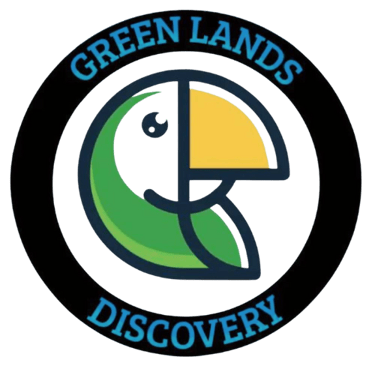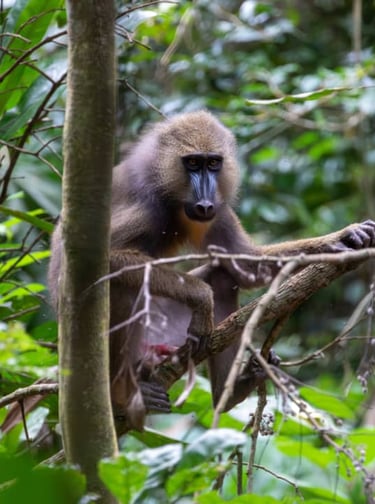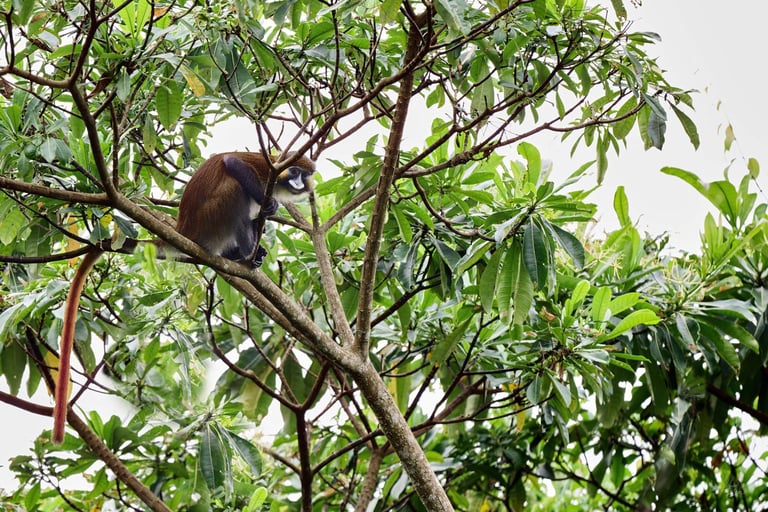Monkeys in Gabon
Gabon is home to nine species of monkeys facing threats from poaching and habitat loss; learn about the vital conservation efforts through NGOs, ecotourism, and local education working to protect them.
NEWS
Monkeys in Gabon: A Treasure to Protect
Gabon is a haven for primates, home to nine different species including the mandrill, gorilla, and chimpanzee. These fascinating creatures share many similarities with us: they are intelligent, communicate with each other, and some in captivity even learn sign language. Their resemblance to humans and their captivating behavior allow us to learn a great deal from them.
Why We Love Them
Monkeys resemble us in many ways. Their intelligence and ability to communicate make them particularly endearing. Some monkeys in captivity have even learned to use sign language to interact with humans. They are also very social and display complex behaviors that remind us of our own social interactions. Additionally, their problem-solving abilities and use of tools highlight their remarkable intelligence.
For instance, researchers have observed chimpanzees in Gabon using insects to treat their wounds. This behavior was documented in Loango National Park, where chimpanzees were seen capturing insects and applying them to open wounds. This not only shows their ability to use tools but also their capacity for prosocial behavior, as they treat not only their own wounds but also those of others in their group.
Threats: The Challenges They Face
Unfortunately, these extraordinary creatures are threatened by several factors. Poaching for bushmeat and the pet trade endangers their populations. Additionally, the destruction of their habitat due to deforestation and human expansion poses a serious threat to their survival. Human pressure on their natural ecosystems is a constant challenge for the conservation of monkeys in Gabon.
Conservation Efforts: How We Protect Them
Non-Governmental Organizations (NGOs)
Several NGOs work tirelessly to protect Gabon's monkeys. Conservation programs, like those in Moukalaba-Doudou National Park, aim to preserve great apes and their natural habitat. These initiatives include monitoring monkey populations, combating poaching, and rehabilitating orphaned monkeys to return them to the wild.
Ecotourism
Ecotourism also plays a crucial role in protecting monkeys. Promoting sustainable tourism activities, such as gorilla watching, generates revenue that can be reinvested in conservation efforts. Moreover, it raises visitors' awareness of the importance of preserving monkeys' natural habitats.
The Key to Success : Education and Local Participation
While the efforts of NGOs and ecotourism are essential, the best solution lies in educating and motivating local populations to actively participate in conservation. Raising local communities' awareness of the importance of protecting monkeys and their environment can create lasting change. Encouraging locals to engage in sustainable tourism and become guardians of their own natural heritage can ensure a better future for Gabon's monkeys.
Conclusion
Protecting Gabon's monkeys is a shared responsibility that requires concerted efforts from NGOs, ecotourism initiatives, and most importantly, the participation of local communities. By understanding the challenges they face and supporting conservation efforts, we can ensure that these fascinating creatures continue to thrive in their natural habitat.
Sources:






